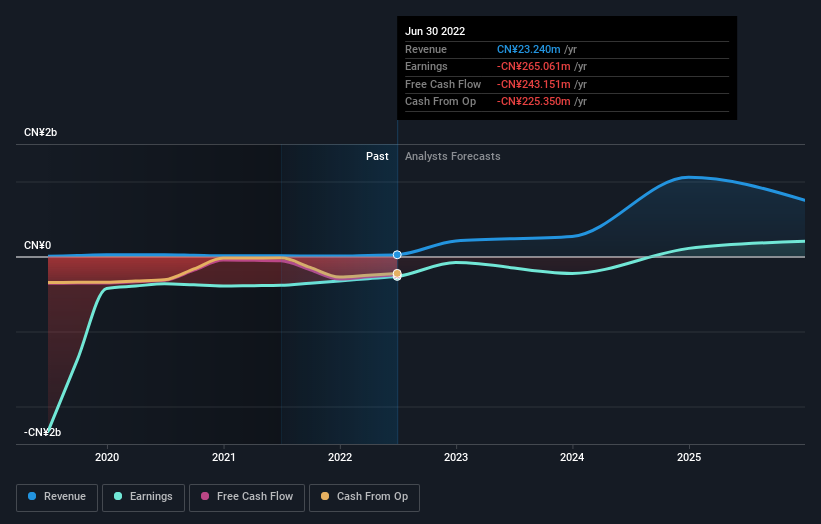Hua Medicine (Shanghai) Ltd.'s (HKG:2552) biggest owners are individual investors who got richer after stock soared 9.8% last week

A look at the shareholders of Hua Medicine (Shanghai) Ltd. (HKG:2552) can tell us which group is most powerful. And the group that holds the biggest piece of the pie are individual investors with 51% ownership. In other words, the group stands to gain the most (or lose the most) from their investment into the company.
As a result, individual investors were the biggest beneficiaries of last week’s 9.8% gain.
Let's delve deeper into each type of owner of Hua Medicine (Shanghai), beginning with the chart below.
Check out our latest analysis for Hua Medicine (Shanghai)

What Does The Institutional Ownership Tell Us About Hua Medicine (Shanghai)?
Institutional investors commonly compare their own returns to the returns of a commonly followed index. So they generally do consider buying larger companies that are included in the relevant benchmark index.
We can see that Hua Medicine (Shanghai) does have institutional investors; and they hold a good portion of the company's stock. This implies the analysts working for those institutions have looked at the stock and they like it. But just like anyone else, they could be wrong. When multiple institutions own a stock, there's always a risk that they are in a 'crowded trade'. When such a trade goes wrong, multiple parties may compete to sell stock fast. This risk is higher in a company without a history of growth. You can see Hua Medicine (Shanghai)'s historic earnings and revenue below, but keep in mind there's always more to the story.

Hua Medicine (Shanghai) is not owned by hedge funds. The company's largest shareholder is Arch Venture Partners, L.P., with ownership of 13%. Meanwhile, the second and third largest shareholders, hold 11% and 7.6%, of the shares outstanding, respectively. Additionally, the company's CEO Li Chen directly holds 4.0% of the total shares outstanding.
Our studies suggest that the top 21 shareholders collectively control less than half of the company's shares, meaning that the company's shares are widely disseminated and there is no dominant shareholder.
While studying institutional ownership for a company can add value to your research, it is also a good practice to research analyst recommendations to get a deeper understand of a stock's expected performance. There are plenty of analysts covering the stock, so it might be worth seeing what they are forecasting, too.
Insider Ownership Of Hua Medicine (Shanghai)
The definition of an insider can differ slightly between different countries, but members of the board of directors always count. Company management run the business, but the CEO will answer to the board, even if he or she is a member of it.
Insider ownership is positive when it signals leadership are thinking like the true owners of the company. However, high insider ownership can also give immense power to a small group within the company. This can be negative in some circumstances.
We can report that insiders do own shares in Hua Medicine (Shanghai) Ltd.. As individuals, the insiders collectively own HK$235m worth of the HK$4.8b company. Some would say this shows alignment of interests between shareholders and the board. But it might be worth checking if those insiders have been selling.
General Public Ownership
The general public -- including retail investors -- own 51% of Hua Medicine (Shanghai). This size of ownership gives investors from the general public some collective power. They can and probably do influence decisions on executive compensation, dividend policies and proposed business acquisitions.
Private Equity Ownership
Private equity firms hold a 31% stake in Hua Medicine (Shanghai). This suggests they can be influential in key policy decisions. Sometimes we see private equity stick around for the long term, but generally speaking they have a shorter investment horizon and -- as the name suggests -- don't invest in public companies much. After some time they may look to sell and redeploy capital elsewhere.
Next Steps:
I find it very interesting to look at who exactly owns a company. But to truly gain insight, we need to consider other information, too. Consider risks, for instance. Every company has them, and we've spotted 1 warning sign for Hua Medicine (Shanghai) you should know about.
Ultimately the future is most important. You can access this free report on analyst forecasts for the company.
NB: Figures in this article are calculated using data from the last twelve months, which refer to the 12-month period ending on the last date of the month the financial statement is dated. This may not be consistent with full year annual report figures.
Valuation is complex, but we're here to simplify it.
Discover if Hua Medicine (Shanghai) might be undervalued or overvalued with our detailed analysis, featuring fair value estimates, potential risks, dividends, insider trades, and its financial condition.
Access Free AnalysisHave feedback on this article? Concerned about the content? Get in touch with us directly. Alternatively, email editorial-team (at) simplywallst.com.
This article by Simply Wall St is general in nature. We provide commentary based on historical data and analyst forecasts only using an unbiased methodology and our articles are not intended to be financial advice. It does not constitute a recommendation to buy or sell any stock, and does not take account of your objectives, or your financial situation. We aim to bring you long-term focused analysis driven by fundamental data. Note that our analysis may not factor in the latest price-sensitive company announcements or qualitative material. Simply Wall St has no position in any stocks mentioned.
About SEHK:2552
Hua Medicine (Shanghai)
Operates as a drug development company that focuses on therapies for the treatment of diabetes in China.
Slightly overvalued with imperfect balance sheet.


